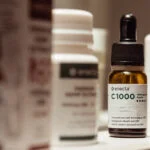What is the Link Between Serotonin and Depression?
Many people struggling with depression find themselves searching for a natural remedy for this common mood disorder – one that doesn’t involve medication with potentially worrying side effects or expensive therapy sessions.
One potential lifeline is serotonin, a chemical produced within the body which is often linked to depression as it is regarded as a natural mood-booster.
So what exactly is this chemical, and how does it affect our moods and emotions when we are struggling with something as serious as depression?
What is serotonin?
Often labelled as the ‘happy chemical’, serotonin is a natural hormone produced by the body.
Its crucial role is to regulate and stabilise our moods, sleep, emotions, digestion and other crucial bodily functions and it does this by transmitting signals between nerve cells. [1]
Serotonin is a multi-faceted hormone with a number of key roles within the body and is almost entirely produced in the intestines.
Key roles for serotonin within the body include:
1. Sleep
Working in tandem with other hormones and neurotransmitters such as dopamine and melatonin, serotonin helps to regulate your sleep levels and determine the quality of your slumber as well as the times that you fall asleep.
Your body is unable to produce melatonin without serotonin, so having healthy levels of this hormone is essential for a healthy sleep routine.
2. Digestion
Serotonin helps to signal to the brain that the stomach is full, allowing us to stop eating at a natural point.
It also acts to protect the stomach and intestines from anything irritating or poisonous that has been ingested, providing an extra boost of the hormone in order to make us vomit or expel the unwanted food as quickly as possible.
3. Mood
Serotonin is often artificially increased with certain medications in order to treat mood disorders such as depression and anxiety, as it plays a key role in regulating our moods and contributing to our emotional well-being and happiness.
However, it is impossible to measure the levels of serotonin in the brain of a living person, so more research is needed to determine this hormone’s exact role and importance on our moods.
4. Sexual desire
Healthy serotonin levels can also help to manage and regulate our libido, altering how often and how much we want to engage in sexual activity.
If your body produces a large amount of serotonin on a regular basis then you may have a higher sex drive than someone who produces lower amounts of this hormone.
What is depression?
Depression is a form of mood disorder and one of the most common mental health conditions, affecting men and women of all ages despite race or economic status.
It is characterised by a constant low mood and feelings of sadness that lasts for a number of weeks or even months at a time, despite any positive events that are occurring.
When someone is depressed, they often lack interest and motivation and struggle to engage in the activities that they previously enjoyed.
It’s normal to feel sad sometimes, but depression is much more persistent and may not appear to be connected to any particular event.
Common symptoms of depression
- A constant low mood that continues for a number of weeks or months
- Tiredness and fatigue
- Lack of energy and motivation
- Little interest in activities, hobbies and events that were previously enjoyed
- Thoughts of self-harm or suicide
- Difficulty making decisions
- Inability to focus and remember small details
- Feelings of guilt, shame and worthlessness
- Lack of appetite, or eating too much
- Noticeable weight gain or weight loss
- Feeling as though you are speaking and moving in slow motion
If you are struggling with chronic depression and have begun to have thoughts of self-harm and/or suicide, you do not need to suffer alone.
Suicide is never the answer and you need help and support to get you through this difficult time – reach out to a trusted friend or family member, or call the Samaritans on 116 123. In an emergency, dial 999 for immediate medical assistance.
What is the link between serotonin and depression?
Serotonin and depression are undeniably linked, but probably not in the way that you might think.
Contrary to popular belief, a lack of serotonin alone does not cause depression. When the body is not producing enough serotonin it can result in a number of problems and may affect your mood, digestion, and sleep along with a number of other essential functions.
Unsurprisingly, this can contribute to feelings of depression.
Drinking alcohol and taking drugs can artificially raise the levels of serotonin in the brain and body, leading to a spike of euphoria and pleasure while you are under the influence. As these substances leave your system the levels of serotonin will quickly drop, often causing extreme depression and anxiety.
This example can be seen as proof that serotonin and mood are linked, although it is not known which one influences the other.
Do women and men have the same levels of serotonin?
A number of studies have been undertaken in order to determine whether men and women have similar or differing levels of serotonin.
The majority of them have found that while the levels of serotonin are relatively identical in both genders, women and men naturally react in different ways to any decrease in this hormone.
Men tend to become more impulsive, while women suffer from low moods and increased caution. This may indicate that each gender utilises serotonin in different ways and could go some way towards explaining why women are more prone to mood disorders while men are more likely to struggle with addiction and ADHD. [2]
How can I increase my serotonin levels if I’m feeling depressed?
In some cases, your body may be unable to produce the levels of serotonin required to keep your brain and body functioning at optimal and healthy levels and this can result in feelings of depression and lethargy.
Thankfully there are a number of simple and healthy ways to increase your serotonin levels, and these steps are recommended if you are feeling depressed as they can help to naturally boost your mood without requiring you to spend money or take prescription medication.
1. Eat a specific diet
While the body is unable to produce serotonin from food, it is possible to derive specific amino acids such as tryptophan from the foods that you eat which are then converted into serotonin.
Tryptophan is commonly found in high-protein foods such as peanut butter and turkey, and some studies have shown that the effects are greater when consumed alongside carbohydrates such as wholewheat bread and rice.
2. Exercise regularly
Another way to naturally produce extra tryptophan is to exercise regularly in order to get your heart rate up and begin to sweat.
You do not have to engage in extremely high-impact and skilful sports in order to increase your serotonin levels – simply taking a brisk walk or swimming laps in the pool can be enough to encourage the body to produce more tryptophan.
3. Get some sunshine
If you find yourself feeling depressed during the winter and brighter during the summer, you may be suffering from seasonal affective disorder (SAD) which is thought to be linked to lower levels of serotonin during the colder and darker months.
As a result, stepping outside into the sunshine for just 10-15 minutes on a regular basis is thought to encourage the body to synthesise this hormone, and you can use a light therapy box during the winter to mimic the sunshine on your skin. [3]
4. Take supplements
If you need to quickly increase your serotonin levels, it’s possible to supplement larger amounts of tryptophan with high-quality supplements from a trusted manufacturer. These may include probiotics, 5-HTP and pure tryptophan pills.
Make sure to speak with your doctor before taking tryptophan supplements to ensure that they do not interfere with any prescribed medication, birth control or other vitamins that you are currently taking.
5. Try massage therapy
Many people see massage therapy as a luxury reserved for people who have a large amount of disposable income. However, a massage from a partner, friend or family member can provide all the benefits of a professional pamper session and encourage your body to produce an increased amount of serotonin and dopamine.
This can reduce feelings of depression and anxiety and help to relax your mind and body during times of stress.
6. Practice meditation and mindfulness
The mind is an extremely powerful organ with the ability to change your entire mood and experience by simply visualising a past experience or memory.
Instead of waiting for your serotonin levels to increase and therefore improve your mood, try doing the opposite by naturally improving your mood as a way to encourage your body to produce additional serotonin.
This can be achieved by taking a quiet moment to think about a positive and happy memory that you have, and really making the effort to visualise every detail as well as how you felt in that moment.
References
[1] https://www.ncbi.nlm.nih.gov/pmc/articles/PMC5864293/
[2] https://www.ncbi.nlm.nih.gov/pmc/articles/PMC4471964/
[3] https://www.ncbi.nlm.nih.gov/pmc/articles/PMC2077351/





